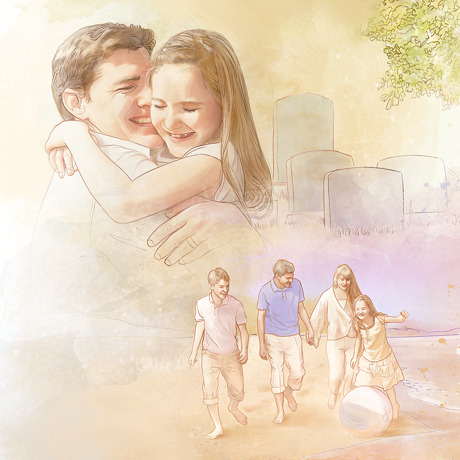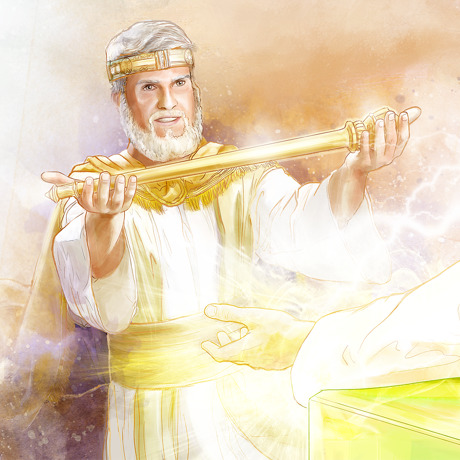Peace for a Thousand Years—And Beyond!
“That God may be all things to everyone.”—1 CORINTHIANS 15:28.
Micah 4:4
1. What exciting things will the “great crowd” enjoy?
IMAGINE all the good things that a powerful government with a kind and fair ruler could do for people in one thousand years. The “great crowd” will enjoy such good things. They are the ones who will survive “the great tribulation,” which will bring a complete end to the present wicked system of things.—Revelation 7:9, 14.
2. What have humans experienced during the past 6,000 years?
2 During the past 6,000 years, humans have tried to rule themselves. This has caused much pain and suffering to mankind. Long ago, the Bible said: “Man has dominated man to his injury.” (Ecclesiastes 8:9) What is happening today? There are wars and rebellions. There are such problems as poverty, sickness, the destruction of the environment, climate change, and more. Government officials have warned that the results will be very bad if we do not make big changes and stop damaging the earth.
3. What will happen during the Thousand Year Reign?
3 Under the rule of Jesus, God’s Messianic King, and the 144,000 who will rule with him, God’s Kingdom will undo all the damage that has been done to humans and the earth. During the Thousand Year Reign, the comforting promise of Jehovah God will come true: “I am creating new heavens and a new earth; and the former things will not be called to mind, neitherwill they come up into the heart.” (Isaiah 65:17) What wonderful events will happen in the future? Bible prophecy can help us understand what these marvelous events will be, even though they are “unseen,” or have not yet happened.—2 Corinthians 4:18.
THEY WILL BUILD HOUSES AND PLANT VINEYARDS
4. Where do many people live today?
4 Everybody wants to have his own home, a place where he can feel safe and secure with his family. But in today’s world, it is difficult to find a place to live. Many people are packed into crowded cities. They may have to live in shantytowns or in old, dirty buildings. They can only dream of having their own home.
5, 6. (a) How will Isaiah 65:21 and Micah 4:4come true? (b) How can we receive that blessing?
5 When the Kingdom rules the earth, everyone will have his own home. Isaiah prophesied: “They will certainly build houses and have occupancy; and they will certainly plant vineyards and eat their fruitage.” (Isaiah 65:21) However, they can look forward to more than just having their own home. Today, some people live in their own home, and some even have a very big house. But they worry that they will not be able to afford it anymore. Or they worry that burglars or other criminals will break in. When the Kingdom rules, no one will worry about these things. The prophet Micah wrote: “They will actually sit, each one under his vine and under his fig tree, and there will be no one making them tremble.”—Micah 4:4.
When the Kingdom rules the earth, everyone will have his own home
6 What should we do if we want to live under Kingdom rule? Of course, all of us need a place to live. But we should not try to get our dream home now and go deep into debt to get it. We would be wise to live in a way that shows we are focused on Jehovah’s promise. Jesus said of himself: “Foxes have dens and birds of heaven have roosts, but the Son of man has nowhere to lay down his head.” (Luke9:58) Jesus could have built or bought the best house that anyone could ever have. Why did he not do that? Jesus did not want to get involved in anything that would stop him from putting the Kingdom first in his life. Can we follow his example and not allow material things to become the most important part of our life and cause us anxiety?—Matthew 6:33, 34.
7. What did Jehovah command about the relationship between humans and animals?
7 When Jehovah began to create things on earth, he created humans last. He told his Master Worker, Jesus, why he created humans: “Let us make man in our image, according to our likeness, and let them have in subjection the fish of the sea and the flying creatures of the heavens and the domestic animals and all the earth and every moving animal that is moving upon the earth.” (Genesis 1:26) God commanded Adam and Eve to take care of the animals and have authority over them. Eventually all humans were to have that authority.
8. How do animals behave today?
8 Is it possible for humans to have authority over all the animals and to be at peace with them? Many people love their pets, such as dogs and cats. But what about wild animals? Scientists who have lived close to wild animals and studied them have found that all mammals have emotions. We know that animals become frightened and angry when they are threatened, but can they show affection? The scientists said that when mammals raise their young, they show great tenderness.
Humans will have authority over all the animals and will be at peace with them
9. How will animals be different in the future?
9 So we should not be surprised that the Bible says there will be peace between humans and animals. (Read Isaiah 11:6-9;65:25.) Why should we not be surprised? Remember that when Noah and his family came out of the ark after the Flood, Jehovah told them: “A fear of you and a terror of you will continue upon every living creature of the earth.” Now many animals run away from humans to protect themselves. (Genesis 9:2, 3) But Jehovah can remove some of that fear, so that the relationship between humans and animals will be exactly as he had commanded in the beginning. (Hosea 2:18) What an enjoyable time that will be for everybody who will live on earth!
“HE WILL WIPE OUT EVERY TEAR”
10. Why do humans cry?
10 Solomon saw that many bad things were being done on earth and that many people had no one to help them. So he said with great sadness: “Look! the tears of those being oppressed, but they had no comforter.” (Ecclesiastes 4:1) Today things are similar, or even worse. Who of us has not cried for some reason? Sometimes we cry because we are happy. But most of the time, we cry because our heart is full of sorrow.
11. Which story in the Bible especially moves you?
11 Think about the many stories we read in the Bible of people who cried. When Sarah died at the age of 127, “Abraham came in to bewail Sarah and to weep over her.” (Genesis 23:1, 2) When Naomi said good-bye to her two daughters-in-law, “they began to raise their voices and weep,” and then “they raised their voices and wept some more.” (Ruth 1:9, 14) When King Hezekiah was very sick and it seemed that he would die, he prayed to God and “began to weep profusely.” Jehovah saw his tears and healed him. (2 Kings 20:1-5) And we are all moved by what happened when the apostle Peter denied Jesus. When Peter heard the cock crow, he “went outside and wept bitterly.”—Matthew 26:75.
12. How will the Thousand Year Reign bring relief to mankind?
12 Because so many sad things happen to people, humans need comfort and relief. During the Thousand Year Reign of Christ, God “will wipe out every tear from their eyes, and death will be no more, neither will mourning nor outcry nor pain be anymore.” (Revelation 21:4) It is wonderful to think that there will be no more pain and suffering. It is even more wonderful that God promises to take away death. How will that happen?
“ALL THOSE IN THE MEMORIAL TOMBS” WILL COME BACK TO LIFE
13. How has death affected humans since Adam sinned?
13 Ever since Adam sinned, death has ruled over humans like a king. It has been an enemy that no one can fight successfully. No sinful human can escape it, and it has caused great sorrow and grief. (Romans 5:12, 14) Millions of people are afraid that they will die, so they are “subject to slavery all through their lives.”—Hebrews 2:15.
14. What will happen when death no longer exists?
14 The Bible talks about the time when “death is to be brought to nothing,” or when death will no longer exist. (1 Corinthians 15:26) This promise will benefit two groups of people. The “great crowd” of Jehovah’s people, who are alive now, will be able to survive into the new world. Then it will be possible for them to live forever. It will also be possible for the billions of people who have died to come back to life. Can you imagine how happy and excited everyone will be when those of the great crowd welcome back the resurrected ones? If we carefully read Bible stories about people who were resurrected, we will understand what it may be like when people are resurrected in the future.—Read Mark 5:38-42; Luke 7:11-17.
The resurrection is one of the greatest events that we have yet to see
15. How would you feel if you saw one of your dead loved ones come back to life?
15 Think of the words “they were beside themselves with great ecstasy” and “they began to glorify God.” If you had been there when those people were resurrected, perhaps you would have felt the same way. It will make us very happy and excited to see our dead loved ones come back to life in the resurrection. It will be marvelous! Jesus said: “The hour is coming in which all those in the memorial tombs will hear his voice and come out.” (John 5:28, 29) None of us have ever seen such a thing happen. It will really be one of the greatest of “the things unseen,” that is, one of the greatest events that we have yet to see.
GOD WILL BE “ALL THINGS TO EVERYONE”
16. (a) Why should we be eager to speak about the blessings that we have not yet experienced? (b) What did Paul say to encourage the Christians in Corinth?
16 People who remain faithful to Jehovah in these difficult times have a wonderful future! Even though we have not yet experienced the blessings that will come, we need to think about them. This will help us to focus on what is really important. Then we will keep serving Jehovah and avoid being distracted by the things in this world. (Luke 21:34; 1 Timothy 6:17-19) Let us be eager to speak about our hope for the future when we have our family study and worship, when we talk to our brothers and sisters, and when we have discussions with Bible students and interested people. This will keep our hope real to us. This is how the apostle Paul encouraged his fellow Christians. His words helped them to think about the things that would happen at the end of Christ’s Thousand Year Reign. Try to imagine the full meaning of Paul’s words at 1 Corinthians 15:24, 25, 28.—Read.
When he completes his work as King, Jesus will humbly give the Kingdom to his Father
17, 18. (a) In what way was Jehovah “all things to everyone” at the beginning of human history? (b) What will Jesus do to bring back peace and unity?
17 There is no better description of how life will be at the end of the thousand years than the words “that God may be all things to everyone.” What does that mean? Think back to the time in Eden when Adam and Eve were a part of Jehovah’s peaceful family. Jehovah, the Universal Sovereign, ruled directly over all those he created, whether they were in heaven or on earth. They could communicate with Jehovah, worship him, and be blessed by him. He was “all things to everyone.”
18 That peaceful relationship was damaged when Satan influenced humans to rebel against Jehovah. But since 1914 the Kingdom has been taking steps to bring back that peace and unity. (Ephesians 1:9, 10) During the Thousand Year Reign, wonderful things that are “unseen” because they have not yet happened will become a reality. Then comes “the end,” that is, the end of the Thousand Year Reign of Christ. What will happen then? Even though Jesus has been given “all authority” in heaven and on earth, he does not want to be equal to Jehovah. He humbly “hands over the kingdom to his God and Father.” He will use his special position and authority “to the glory of God the Father.”—Matthew 28:18; Philippians 2:9-11.
19, 20. (a) How will all who live under the authority of the Kingdom show whether they accept Jehovah’s sovereignty? (b) What wonderful things will we enjoy in the future?
19 By then, all who live on earth under the authority of the Kingdom will be perfect. They will follow Jesus’ example. And because they are humble, they will be happy to accept Jehovah’s right to rule over them. They will pass the final test if they show that they want Jehovah to rule over them. (Revelation 20:7-10) After that, all rebels, whether they are angels or humans, will be destroyed forever. What a joyful time that will be! Everyone in Jehovah’s family, in heaven and on earth, will praise him. And Jehovah will be “all things to everyone.”—Read Psalm 99:1-3.
20 Will the wonderful things that the Kingdom will soon bring motivate you to focus your attention and efforts on doing Jehovah’s will? Can you make sure that the false hope and comfort that Satan’s world offers does not make you forget that you should be serving Jehovah? Has your decision to support Jehovah’s right to rule been strengthened? Let your actions prove that you want to do that forever. Then you will be able to enjoy peace and prosperity, not only for a thousand years but for all eternity!
- Forums
- Philosophy & Religion
- How the world will end (i.e. our system of things)
How the world will end (i.e. our system of things), page-2
- There are more pages in this discussion • 133 more messages in this thread...
You’re viewing a single post only. To view the entire thread just sign in or Join Now (FREE)







